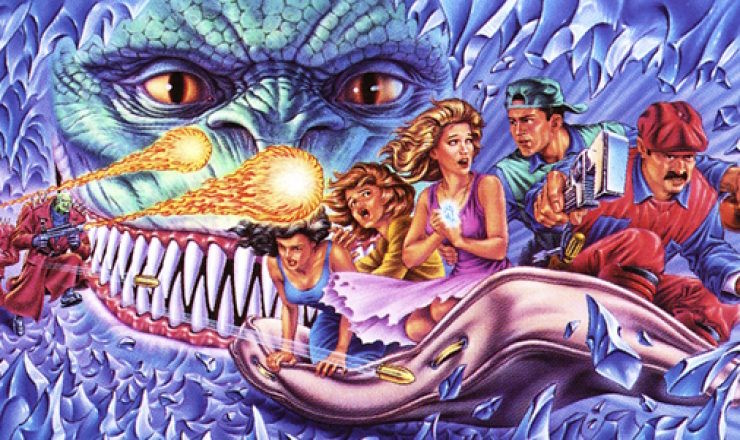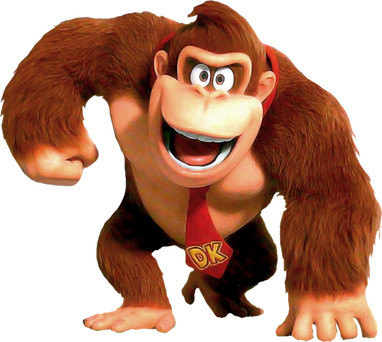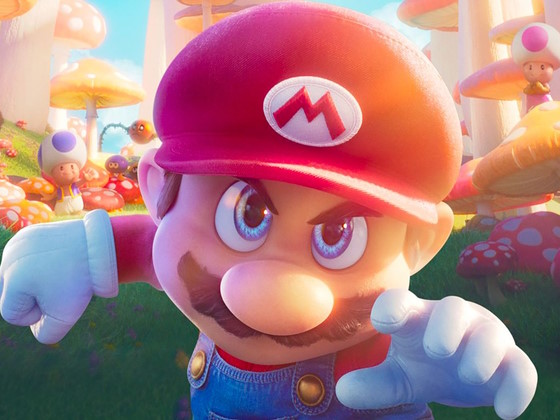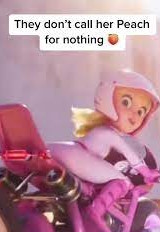
The Super Mario Bros. Movie is probably one of the bigger success stories in 2023 and while there are a lot of videos you can find on how it breaks the conservative brain and really exposes how malleable "woke" is to these people, that's not really something I want to comment on simply because you can find so much on this effect. Rather, I want to scope through the Mario Movie with more of a legacy angle, as to what effects it might have on the brand for time to come.
When Donkey Kong was first released in arcades, it's rather famously known that Mario was known as Jumpman originally and that the basic skeleton of characters and dynamics were present that would morph into the modern Mario mythos we see today. The further back you go, the weirder the approach to Mario is until it crystallizes around the Gamecube era after Sunshine, in which the games have taken a very hardline stance on how these characters appear, how they act, and more. Sunshine was the last time that they really toyed with different art direction for certain classic enemies and while the lore of the world is still somewhat malleable as seen in Super Mario Odyssey, it's still rather rigid in most cases. Pauline came back, sure, but it's not as if she had been absent this whole time and her design reflects the modern one that was introduced all the way back in Donkey Kong '94.
One of the more interesting things to note about the Illumination-made picture is they changed the design of Donkey Kong. It's been hotly contested for years as to whether Miyamato actually approved of what Rare was doing with his character, as his design was drastically changed from all depictions that were floating around back when the character was mostly stuck to arcades. We still don't really have that much of an
answer in this regard, but it is important to note that the Illumination design does harken back to features present on the original Donkey Kong. This may have been done to make him more expressive for all I know, but it's still an interesting note that Nintendo themselves have done.

Likewise, Spike from Wrecking Crew appears in the movie and it's a bit of an odd depiction. The movie doesn't really work divorced from all the context provided with past Mario work, but Spike's appearance in the movie is entirely brand new and his Japanese name was even changed to be aligned with the American name because that's the one used in this movie. Spike is a rival to Mario in the traditional sense in Wrecking Crew, but in the movie the Bluto-esque dynamics that are also embodied by Donkey Kong and Bowser are also present with Spike, although to a more emotional grounded level. There is history behind both Mario and Luigi with Spike that we don't see but it gives me the impression that Nintendo may see potential for Spike in the future.
The legacy of the movie is sort of the most interesting and unknowable thing to come out of this project. It's no secret that Nintendo themselves have set up a new company specifically to produce media of their own properties, and they have their own unique plate that plays before the movie alongside Illumination. This new company was formed over the architecture of Dynamo Pictures who produced the Pikmin shorts, although it is clear that the company is not independent enough of a body to produce its own films yet. Time will tell how much Illumination is still in the picture for Nintendo, but co-producing a billion dollar movie is not bad for a new film company out of the gate.
Still, films take a long time to make. Animation films take a long time to make. While a Donkey Kong film has been more or less in the works alongside an expansion to the Nintendo World park in Universal's theme park, it does speak to a greater ambition than Nintendo has previously expressed in the past. Whether Nintendo becomes fully autonomous in the film industry is more of a long-term goal, if it's one at all, although it would be hard to argue that they have greater ambition for the theme park space than just working with Universal Studios.
That being said, I'm not sure if the Mario movie is actually an indication that Nintendo wants to become a juggernaut in the film industry. Typically when Nintendo enters a new space and enterprise, it's usually with a bigger idea in mind. Their LEGO project is so unlike any of LEGO's other themes that it's probably one of the most successful app-based licenses that LEGO has attempted and the sets themselves are very different from the traditional LEGO offering, with a clear focus on creating courses with a approach to engaging imaginative play in a different way that isn't normal with modern day LEGO.
Likewise, their foray into the Universal Studios theme park design world is almost endlessly dedicated to making the most use out of the space- while there are still attractions, they have gone one step beyond Disney in the sense that a lot of elements outside of even line queues are meant to be interacted with and engaged with. It's vertically designed in a way that theme parks rarely are.
What's the movie's big idea? I'm not really able to discern at the moment. It goes through plot beats in a fairly standard way aside from a few interesting notes I'll talk about later but it is unique among video game movies in that it is completely soaked in the source material in a way that has been asked for by video game fans for a long time but hasn't really been realized to the extent this is.

I don't think that's the idea meant to be presented in this movie but it really does achieve that much to its detriment at times. You kind of need a working background of how the Mario series works to understand this movie and that's a little bit of the trick on this one because a lot of the logic relies on video game rules and understanding. While there is the bare minimum understanding of the mechanics that drive the movie, and ultimately aren't completely important, it's still an approach you don't see in other film projects that adapt video games.
It feels like a shortcut in the movie's script- because it does so little to establish the rules of the world and setting, things can happen within 90 minutes and generally you walk out of the theater feeling as if you have seen a good movie. It's not to say this approach is bad because it does work, but it is a shortcut and I don't think it works long-term.
Still, this is the approach that the Harry Potter movies took and were generally accepted for- especially the later movies which truncated events so tightly that it's probably not that unreasonable to say those movies don't make sense unless you've read the source material- and so many people have, so they work in the mechanical traditional sense. It's not that audiences are opposed to needing to do additional work to understand movies, but in order for it to work it needs to be done with something that has a very large overlap with an audience.
The best adaptations are the ones that often loosely fit the source material
over the medium in which it is being adapted into, where as the Mario movie took a approach that doesn't require your understanding for how events play out- this is a new story that takes loose ideas that have been floating in the subconscious of the franchise for a while and fits them together into a somewhat coherent narrative, but your understanding of Mario is going to inform the parts of this that bring in power-ups and ancillary characters. It's the logic and world around the events of this movie that requires extra reading, since the film is not going to explain what a Tanooki Leaf is or what a Cat Bell is.
Critically, this is a pretty big drift from something like the Marvel Cinematic Universe, which produced an unfathomable amount of material adapted from comics, but very loosely. There was nothing ever in the MCU that actually required you to know about the comics and it didn't incentivize people to go out and read them because they were at complete and utter odds with each other at release. Dr. Strange has a new movie? He's just been murdered in the comics. Many of the weirder parts of the MCU don't even hail from the comics- Shang-Chi is almost an entirely original tale with very little taken from any source material. There's no further context beyond itself to understand these movies- if even that. The closest the MCU rubbed against this idea of needing external knowledge beyond the MCU was
Spider-Man: No Way Home which again, got away with this due to a venn diagram being basically a circle in terms of the audience and knowledge.

The Super Mario Bros. Movie potentially has the power to start something that can be bigger than the MCU, although it wouldn't be the films themselves entirely. One of the great things about video games is that they offer experience, which is not something any other medium really has beyond traditional board games. You don't just get to think about the events from the movie- you could buy any Mario game and experience something fun yourself. This could be seen as a cynical ad and it is a little bit, but I think it does sort of feed into an ecosystem that Nintendo has created as of late that I believe is linked. Everything I've talked about, from LEGO to Universal Studios' Nintendo World to this all sort of circulates back to the games and the games inform all products that then are released. In theory, you could be just a fan of one aspect of Mario, but it's more likely that you are meant to engage with it in the way only Disney has been able to successfully manage, which is breathing Mickey in your everyday life.
What I'm basically saying is that Nintendo needs to get into real estate and start lobbying the government to basically act as their own micro-country to get on the level that they clearly are striving for. Jokes aside, if Nintendo is going to continue to branch out, I think they know that goodwill is something that can be diminished extremely quickly and that's why they tend to come into things with a different angle than just slapping their name and characters onto something. It's an interesting approach, and one that itself slightly introduces risk if not successful in ambition, but all things considered it is at least partially creatively pure in a way that capitalism traditionally does not reward if sowed incorrectly.
The big takeaway, from all of this, is that the Mario Movie is a 6/10. But I am watching developments Nintendo makes with interest, especially with this movie being as successful as it is. It's one of those things that completely managed to dismiss critical reception in an age where even my dad is using Rotten Tomatoes as his barometer as to whether to see a movie or not- and I do think Nintendo and Illumination should listen to criticism regardless of the success. Imagine if this movie was actually good on it's own merits and was able to reach even people that exist outside of the venn diagram of people aware of how Mario works and willing to watch an inoffensive animated movie with their family?
Anyway, signing off on this one for now. I have a lot more thoughts about the modern day Nintendo media strategy, believe it or not, but I almost want to wait until I see if any of it circles back to the games at the center of all of this.





